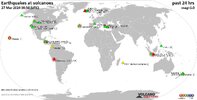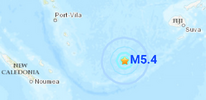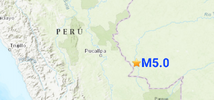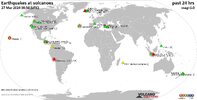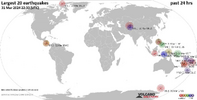XPan
The Living Force
Noticeable Earthquake in Germany
Article via German Vulkane.net by Marc Szeglat
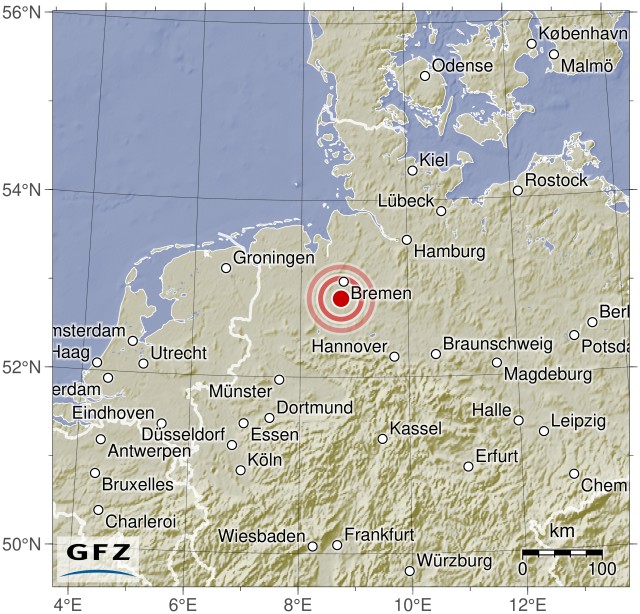

Noticeable earthquake Mb 3.7 shook northern Germany
- Natural gas extraction possibly to blame for the quake
Date 03/25/2024 | Time: 11:07:46 UTC | Location: 52,881 ; 8,763 | Depth: 9 km | Mb 3.7
This morning a noticeable earthquake of magnitude 3.7 occurred in Lower Saxony. While the hypocenter was located at a depth of 9 kilometers, the epicenter was located 5 kilometers southwest of Syke, where about 24,200 people live. This data comes from the EMSC. The GFZ indicates a magnitude of 3.5 and an earthquake focus at a depth of 5 kilometers.
Syke is located in the district of Diepholz, south of the Hanseatic city of Bremen, where the earthquake was also felt. Witnesses from Syke reported that there was a loud bang. Then the houses shook. In fact, there is said to have been slight damage to buildings.
Natural gas is extracted in the region and the "Klosterseelte/Kirchseelte/Ortholz" extraction field is located there. The gas extraction company is ExonMobil. Although slight earthquakes often occur in connection with natural gas extraction, they are usually too weak to be noticeable. Today's earthquake was the strongest for several years.
Earthquakes can occur for various reasons in connection with natural gas extraction. In this case, it is very likely that the extraction of the gas has created tension underground, which has been released in the earthquake. The extraction of the gas creates pressure differences in the rocks of the gas field, which can lead to sudden underground degassing that triggers movements in the rock layers. The loud bang that local residents claim to have heard in connection with the earthquake could be an indication of this.
Earthquakes are particularly common in natural gas and oil extraction when fluids are injected into the ground to increase the extraction pressure. This is particularly the case with controversial fracking. This extraction method is considered particularly harmful to the environment and is banned in Germany.
END OF ARTICLE
Question one • How long will the ban against (toxic) fracking in Germany remain.
Question two • Do we really know, if this isn't already done (perhaps in a small scale to begin with) ?
Article via German Vulkane.net by Marc Szeglat

Deutschland: Erdbeben Mb 3,7 in Niedersachsen - Vulkane Net Newsblog
Heute Vormittag ereignete sich in Niedersachsen ein spürbares Erdbeben der Magnitude 3,7. Es wurde durch Erdgasförderung getriggert.
www.vulkane.net
Noticeable earthquake Mb 3.7 shook northern Germany
- Natural gas extraction possibly to blame for the quake
Date 03/25/2024 | Time: 11:07:46 UTC | Location: 52,881 ; 8,763 | Depth: 9 km | Mb 3.7
This morning a noticeable earthquake of magnitude 3.7 occurred in Lower Saxony. While the hypocenter was located at a depth of 9 kilometers, the epicenter was located 5 kilometers southwest of Syke, where about 24,200 people live. This data comes from the EMSC. The GFZ indicates a magnitude of 3.5 and an earthquake focus at a depth of 5 kilometers.
Syke is located in the district of Diepholz, south of the Hanseatic city of Bremen, where the earthquake was also felt. Witnesses from Syke reported that there was a loud bang. Then the houses shook. In fact, there is said to have been slight damage to buildings.
Natural gas is extracted in the region and the "Klosterseelte/Kirchseelte/Ortholz" extraction field is located there. The gas extraction company is ExonMobil. Although slight earthquakes often occur in connection with natural gas extraction, they are usually too weak to be noticeable. Today's earthquake was the strongest for several years.
Earthquakes can occur for various reasons in connection with natural gas extraction. In this case, it is very likely that the extraction of the gas has created tension underground, which has been released in the earthquake. The extraction of the gas creates pressure differences in the rocks of the gas field, which can lead to sudden underground degassing that triggers movements in the rock layers. The loud bang that local residents claim to have heard in connection with the earthquake could be an indication of this.
Earthquakes are particularly common in natural gas and oil extraction when fluids are injected into the ground to increase the extraction pressure. This is particularly the case with controversial fracking. This extraction method is considered particularly harmful to the environment and is banned in Germany.
END OF ARTICLE
Question one • How long will the ban against (toxic) fracking in Germany remain.
Question two • Do we really know, if this isn't already done (perhaps in a small scale to begin with) ?


